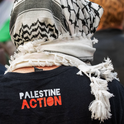Azza Soliman's father wasn't like other Egyptian men. "He always encouraged me to stand up for my rights...he was different," said the human rights lawyer. Despite the fact that Egyptian law states that women should inherit less than their male siblings, before his death Soliman's father insisted that she would inherit an equal share.
In 1995, Soliman co-founded the Centre for Egyptian Women's Legal Assistance (CEWLA) in a slum area of Cairo known as Boulaq. Having grown up in a slum herself, Soliman has spent the past 20 years providing these people, especially women, with legal aid, to help tackle discrimination and violence in her country, and to improve women's political participation and access to justice. During that time, the 49-year-old lawyer has taken on cases involving FGM, honour crimes, domestic violence and divorce law.
Soliman will be in London on 10th September as part of ActionAid's "Fearless" campaign to tackle violence against women and girls around the world. But in just a few weeks' time, she is due to go on trial in Cairo, charged with taking part in an illegal protest, which she denies. If found guilty, she faces up to five years in prison.
Here, Soliman talks to Prospect's Jessica Abrahams about the future for women's rights in Egypt, why the new laws on sexual harassment won't work, and her upcoming trial.
JA: What are some of the most memorable cases you've worked on?
AS: I was deeply affected by the case of the set designer Hend el-Henawy. She was married to a famous actor at the time I took her case, but never contracted that marriage [in Egypt, a couple can have a "common law" marriage that isn't registered with the state and therefore lacks legal protection]. They had a child who he refused to acknowledge was his. For this reason, the child had no official ID. I managed, with CEWLA, to win the case against him and the child holds her father’s name. It was the first time in the courts that DNA tests were used in this way. I also find myself really affected when women are finally granted divorce after long struggles with their former husbands.
What are the biggest challenges of your work?
The political situation in Egypt is a huge risk, as both the community and the government are not prioritising women’s rights—they deal with them as if they are a luxury, not a basic human right. The global economic crisis has also affected our organisation because it resulted in reducing the funds we are receiving from donors... The crackdown on civil society and NGOs [by the authorities] has made our work difficult and some of our beneficiaries stopped coming because they believe media reports which claim that NGOs in Egypt are working against the country. We still do not have a parliament to address [Egypt's parliament was dissolved in June 2012], and there is huge instability in the governmental institutions.
How has life changed for women in Egypt, and your ability to defend their rights, in the years since the Arab Spring?
The most important thing about the revolutions and the Arab Spring is that they broke many taboos that women and society faced [for example by women taking part in the protests]. When the taboos were broken in the public sphere, it was easier for women to break them in the domestic sphere as the feeling of fear was also broken. Therefore, the divorce rate increased, many girls insisted on continuing their education, and many women started initiatives... The situation became both easier and harder at the same time. Many taboos were broken, but there are restrictions on the work of NGOs and organisations like ours, and people started to feel afraid of the government again.
The prevalence of sexual harassment during the protests in Tahrir Square was widely publicised. Often the attacks were highly coordinated; groups of men working together to isolate a woman and assault her. Why do you think that happened?
This issue runs very deep because those attacks are committed by different levels and classes of people, whether old men or young, married or not, educated or not. Additionally, the state itself has violated women before and that was sort of a sign—that since it is done by the state (the protectors) it is OK for average people to do so as well. Also, there are no powerful verdicts against harassers and their actions are justified by the religious discourse and the media rhetoric which blames women.
The Egyptian government has managed to let the world think that they are tackling violence against women and that a new law and strategy will solve these issues. However, the only [legal] changes they made was an amendment to the penal code where sexual harassment is criminalised. These changes, however, are almost useless in practice because the survivor has to prove that the perpetrator acted with the intention of gaining sexual satisfaction. How can you prove that in court?
The strategy also doesn’t tackle the loopholes in the penal code that allow for violence against women—such as Article 17, which gives lower charges in cases of honour crimes, and Article 60, which gives mercy to perpetrators who "acted in good faith," mostly used to legitimise domestic violence by saying that the husband has the right to discipline his wife... Another issue is that often when a women comes to the [authorities] to access their rights after having survived violence, the police would not allow them to file a case or would not act on it because they themselves are not opposed to violence against women... For these reasons the strategy is not comprehensive in tackling the actual issues we have in Egypt.
On 26th September you face trial in an Egyptian court for allegedly taking part in an unauthorised protest, after you witnessed the police shooting of a woman at a memorial march. Why do you believe you've been charged?
On 24th January I was at a café eating lunch when I witnessed [this shooting]... Later that day I heard a woman had been killed and that she was [the poet and activist] Shaimaa el-Sabbagh; she was in her early 30s and mother to a young boy... That evening I went to the prosecutor’s office to give my testimony voluntarily...
Two months later I found out that I was accused of breaching the anti-protest law [along with more than a dozen others]... During the first trial the judge decided to acquit us... [But] the prosecutor appealed the innocent verdict after three days and now the appeal trial is taking place...
Being accused after merely being a witness is a crossing a red line, violating the basic rule of law by the Egyptian government through the judiciary, which should not be tolerated. I managed to put together a coalition... which includes many actors from across civil society in Egypt, lawyers and judges, and which is asking for the government to put in place a law that protects witnesses.
I am confident that I specifically have been targeted because I have been a critical voice against the Egyptian government, whether the Muslim Brotherhood or the military, for years... Earlier this year, I was described in the media as a spy and as someone who is [working] against Egypt, while in reality I am just doing everything I can to improve the situation for women.
What needs to happen for the situation of women in Egypt to improve?
First of all, educational, religious, and media rhetoric has to change and become more woman-friendly. Also, the current legislation has to change in order to give more space to NGOs to work freely and support women to improve their situation... Changes need to happen in the law, especially the Personal Status Law, which deals with a woman’s right to divorce. But changes also need to happen in the judiciary and the police because women are facing difficulties accessing their rights, even if they are enshrined in the law.
Education is important and the roles of religious leaders are important because they have a big influence on people’s opinions in society. For this reason, CEWLA engages in dialogue with both Christian and Muslim religious leaders and educates them on women’s issues, while also engaging in new interpretations of Islamic law in accordance with women’s rights.
The international community needs to stop accepting the rhetoric of the Egyptian government that they are on the right track. It is not the case in reality. The international community must have it as a condition that the government makes actual changes and lives up to the demands of the revolution and starts reforming the police, for a start... it must not go back to supporting repressive governments because of trade and security issues. Long-term stability can only happen through human rights—especially women’s rights."
Is it important that the UN's new Sustainable Development Goals include tackling violence against women and girls?
Violence against women and girls (VAWG) is actually increasing everywhere, not only in the developing countries but also in developed countries; it is taking so many more shapes and forms. This violence is keeping women’s empowerment down and holding back the development of society in general. It is the responsibility of all states to end VAWG in all its forms and the Sustainable Development Goals (SDGs) are important to outline how this should happen... The SDGs must not neglect the responsibility that states have in protecting women human rights defenders and civil society in general. Especially when it comes to Egypt, the government fails in both...
The United Kingdom pays grants to developing countries and is concerned with them developing into better economies and safer societies. If, however, VAWG is not tackled, none of these developments can take place. Violence generates violence and this circle, if not treated early, can have terrible effects.
David Cameron is concerned with my country being a strong ally in fighting terrorism, ensuring stability in the Middle East and in trade agreements... But if women’s issues and basic human rights are not in place in Egypt, no long-term stability can take place and Egypt would then not be in a position to be a strong ally...
Tackling violence against women is key to development. Those women in Egypt who showed leadership in the 2011 revolution and have worked tirelessly to improve women’s issues since should be seen as heroes... Using violence against them is more a sign of weakness than strength.
If Cameron wants strong allies and to see actual improvement in a country like Egypt, ending VAWG is key to reaching this, and the SDG is a good tool, along with other initiatives.
'Violence against women is taking on new shapes and forms'
One of Egypt's leading human rights lawyers explains why her country's attitude to women is worsening
September 09, 2015

Azza Soliman, left, speaks to a woman in Cairo © Rene Clement/ActionAid












